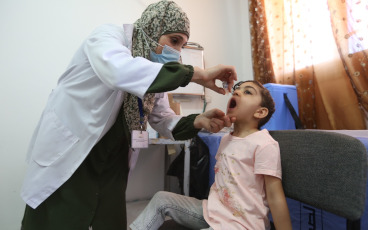IMB delivers frank assessment of progress towards polio-free world
Report highlights need for ‘heightened attention’ at all levels; calls funding gap ‘single greatest threat’.
20 April 2011, Geneva, Switzerland – The report of the 31 March-1 April meeting of the Independent Monitoring Board (IMB) of the Global Polio Eradication Initiative (GPEI) offers its assessment of the progress towards achieving the major milestones of the GPEI Strategic Plan 2010-2012.
Reviewing the latest global epidemiology, the IMB notes considerable achievements since the launch of the Strategic Plan. Of 15 countries with outbreaks starting in 2009, all have been successfully stopped. All new outbreaks from 2010 have been curbed within six months (or are on track to being so). The group concludes, however, that of the remaining endemic and re-established transmission countries, only India is on track to achieve its key milestone, of stopping poliovirus transmission by end-2011, and that therefore, the end-2012 goal of global eradication is at risk. The IMB expresses particular alarm at the current polio situation in Chad, considering it a public health emergency requiring the greatest urgency of action among all remaining polio-affected countries. The IMB called the US$665 million funding gap through end-2012 the ‘single greatest threat to the GPEI’s success’.
Despite these challenges, however, the IMB concludes that polio eradication is feasible in the near term, but warns that this goal will only be achieved with ‘heightened attention’ at all levels. The group welcomes the development of countries’ emergency plans to address remaining operational challenges, and urges for monitoring of these plans at the highest levels of government. The IMB urges the World Health Assembly (WHA) in May to evaluate whether the persistence of polio now constitutes a ‘global health emergency’. And with the economic case for completing polio eradication clearly established, the IMB reminds the international development community that all WHO Member States have together decided to eradicate polio, and therefore full financing of the effort should be a shared responsibility.
The GPEI welcomes the findings and recommendations of the IMB. The heads of the spearheading partner agencies – the World Health Organization (WHO), Rotary International, the US Centers for Disease Control and Prevention (CDC) and UNICEF – and the President of the Global Health Program of the Bill and Melinda Gates Foundation will in the coming days discuss the report and its implications, and commit to specific actions their organizations can take to further support countries’ eradication efforts and ensure critical factors identified by the IMB are addressed.
The IMB was established in 2010, at the request of the Executive Board of WHO and the WHA, to monitor progress against the milestones of the GPEI Strategic Plan 2010-2012. The group’s next meeting is scheduled for 30 June-1 July 2011 in London, United Kingdom.












